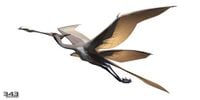Rangmejo
From Halopedia, the Halo wiki
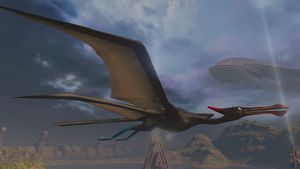
Rangmejo (as they were known to Forerunner Lifeworkers), or "quadwings", are a species of large pterosaur-like creatures with dual sets of wings.[1] They are among the most ubiquitous varieties of fauna that have been encountered on Forerunner installations by the United Nations Space Command, as they have been observed on Installation 00 and multiple Halo rings.[1][2][3] Rangmejo have been known to gather in significant numbers within artificially-constructed chambers.[2]
History[edit]
Rangmejo were among the creatures preserved by the Librarian against the firing of the Halo Array in 97,445 BCE. Following this destructive event they were seeded upon at least two Halo rings, installations 03 and 05, while also being left to flourish on the Ark, Installation 00, far beyond the Milky Way galaxy. Rangmejo had been specifically selected and adapted by Lifeworkers to play diverse and important roles within a wide range of ecosystems, helping to contribute to the overall health and stability of various biomes.[1][5]
In November of 2552 rangmejo were observed by the battling forces of the Covenant and United Nations Space Command when their war brought them to Installation 05.[3] In December of that same year an unfinished Halo ring was fired above the Ark, spelling death for the many sentient creatures which inhabited its surface. The Ark's monitor, 000 Tragic Solitude, eventually then began to breed new life forms.[6] Among these were more rangmejo.[2] Following the discovery and subsequent exploration of Installation 03 by humanity in 2552 and 2553, rangmejo were witnessed there.[2] Respected scientist Doctor Luther Mann's observations of those on Gamma Halo made him certain it would not be safe to get close to them.[2]
In March of 2555 a small group of humans and Sangheili representing the United Nations Space Command and Swords of Sanghelios, respectively, encountered a large number of the creatures within a dimly lit cavern near the Ark's Foundry. Fortunately for them, the rangmejo left abruptly soon after they were sighted.[2][Note 1][7][8][9] By 2558 the UNSC had procured a few individual specimens for scientific study.[1]
Anatomy, physiology, and behavior[edit]
Rangmejo are large creatures with two sets of impressive wings flanking a narrow, muscular body.[1] At one end of that body is a head featuring a strong, lengthy beak and a protruding crest—often brightly colored. At the other is a long tail that can represent over half of the length of the individual's body.[1] Their considerable size is matched by their two large wingspans, the wings of which flap and beat heavily.[2] Rangmejo somewhat resemble Pteranodon species, thanks to their prominent head crests.[2][3] Rangmejo blood is red.[3] The specimens acquired by the UNSC show remarkable evidence of genetic optimization, their ancestors having been specially adapted by Forerunner Lifeworkers.[1] Rangmejo have been noted to make a squealing sound while flocking together in large numbers.[2]
Production notes[edit]
- "They are basically space pigeons, or flying rats. All they do is breed, poop and fly slowly around. Their only known skill is the ability to predict human marksmen and turn just exactly as you were about to shoot them."
- — Frank O'Connor, franchise development director at 343 Industries, responds to a question about quadwings in jest on April Fools' Day.[10]
Quadwings were first developed during the production of Halo: Combat Evolved, and had a model created for inclusion in the game at least around the time of the year 2000. The original model was later released for use in 2023 by the Digsite restoration project, for use in mods created via the Halo Editing Kit.[11] They were ultimately cut from the game for unknown reasons,[11] though would return in Halo 2 as ambient skybox creatures within the campaign missions Delta Halo and Regret.[3][12]
They are absent from Halo 3's campaign but are featured in two of its multiplayer maps: Epitaph and Guardian.[4][13] Within these games it is possible for players to kill the rangmejo flying about, resulting in a bloody eruptions.[14][15] When a Halo-themed texture pack was released for Minecraft in 2014, it allowed the ender dragon in that game to be re-skinned to resemble a quadwing.
Quadwings were first identified as rangmejo the following year within a Canon Fodder entry which followed the release of Halo: Hunters in the Dark.[1] 343 Industries provided a digital asset to Falcon's Creative Group so that it could feature quadwings in "The Ring Experience" at Halo: Outpost Discovery, but the creature ultimately had to be recreated due to what already existed being too undetailed and unrealistic.[8]
Gallery[edit]
Development images[edit]
Unfinished Rangmejo models are shown within an in-progress video for The Ring Experience.[8]
Screenshots[edit]
A quadwing flies across the skies of Installation 05.[3]
Rangmejo of Delta Halo fly about.[3]
Rangmejo appear in the sky above Delta Halo.[3]
One of the quadwings native to Installation 05 flies overhead.[12]
The Rangmejo featured in Halo 3 differ somewhat in appearance from those in Halo 2 or Halo 2: Anniversary[4]
This image provides a top-down view of a quadwing.[4]
One of the Ark's quadwings flies through a forest on the installation.[4]
Rangmejo fly over the surface of Installation 00.[13]
This image provides a good look at a quadwing's head.[13]
A quadwing soars far above a desert on the Ark.[13]
A Rangmejo in the Halo Encyclopedia (2022 edition).
List of appearances[edit]
- Halo 2 (First appearance)
- Halo 3
- Halo 2: Anniversary
- Halo: Hunters in the Dark
- Halo: Outpost Discovery
- Halo: The Television Series
- Inheritance (Mentioned only)
- Halo: Epitaph
Notes[edit]
- ^ Halo: Outpost Discovery, a traveling experience canonically set at some point between 2554 and 2557, includes an attraction called "The Ring Experience" which involves viewing a live feed from a OQ-45 Honeybee drone exploring a Halo ring. Multiple rangmejo can be seen in the environment. The planet which the ring is shown orbiting discounts the possibility that it could be Delta or Gamma Halo, and executive producer of The Ring Experience, Jason Ambler, believes it is supposed to be Zeta Halo. If this is the case, the experience cannot be set any earlier than the point in 2555 when the exploration of that installation began. Officially the identity of the installation shown in The Ring Experience is presently undefined by 343 Industries. It should also be noted that the canonical dating of Outpost Discovery may be able to be further narrowed by a display which claims it is believed 343 Guilty Spark was destroyed in 2552. It was in late 2555 that the UNSC first learned of this monitor's survival.
Sources[edit]
- ^ a b c d e f g h i Halo Waypoint, Cannon Fodder - Jurassic Ark (Retrieved on Dec 13, 2019) [archive]
- ^ a b c d e f g h i j k Halo: Hunters in the Dark, chapter 15
- ^ a b c d e f g h i j k Halo 2, campaign level Delta Halo
- ^ a b c d e Halo 3, multiplayer map Guardian
- ^ Halo Waypoint, Canon Fodder - Outpost Discoveries (Retrieved on Nov 5, 2019) [archive]
- ^ Halo: Hunters in the Dark, chapter 18
- ^ Halo: Renegades, chapter 13
- ^ a b c Halo: Outpost Discovery, The Making of The Ring Experience
- ^ Halo: Outpost Discovery, The Ring Experience
- ^ Halo Waypoint, Canon Fauxder - Believe (Retrieved on Dec 23, 2019) [archive]
- ^ a b Halo Waypoint, Digsite Deliveries (Retrieved on Jul 30, 2021) [archive]
- ^ a b Halo 2, campaign level Regret
- ^ a b c d Halo 3, multiplayer map Epitaph
- ^ Halo 2, Quadwing in-game unit
- ^ Halo 3, Quadwing in-game unit
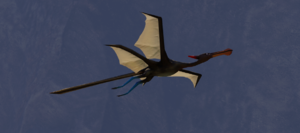
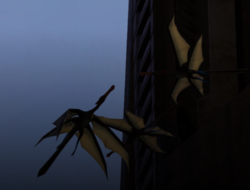

![Unfinished Rangmejo models are shown within an in-progress video for The Ring Experience.[8]](https://halo.wiki.gallery/images/thumb/1/12/HOD_QUAD3D.PNG/161px-HOD_QUAD3D.PNG)
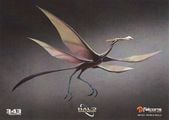
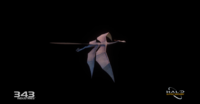
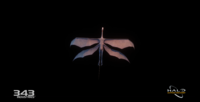
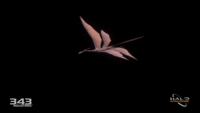
![Rangmejo are silouhetted against the light of the star Coelest.[3]](https://halo.wiki.gallery/images/thumb/6/6a/H2_RANG2.PNG/200px-H2_RANG2.PNG)
![A quadwing flies across the skies of Installation 05.[3]](https://halo.wiki.gallery/images/thumb/4/46/H2-QuadWingBird.png/140px-H2-QuadWingBird.png)
![Rangmejo of Delta Halo fly about.[3]](https://halo.wiki.gallery/images/thumb/c/c5/H2-Delta_Halo_Quadwings.jpg/160px-H2-Delta_Halo_Quadwings.jpg)
![Rangmejo appear in the sky above Delta Halo.[3]](https://halo.wiki.gallery/images/thumb/b/b5/H2_ringbirds.jpg/200px-H2_ringbirds.jpg)
![One of the quadwings native to Installation 05 flies overhead.[12]](https://halo.wiki.gallery/images/thumb/6/67/H2_Quad.jpg/200px-H2_Quad.jpg)
![The Rangmejo featured in Halo 3 differ somewhat in appearance from those in Halo 2 or Halo 2: Anniversary[4]](https://halo.wiki.gallery/images/thumb/5/52/H3_Quad.jpg/200px-H3_Quad.jpg)
![This image provides a top-down view of a quadwing.[4]](https://halo.wiki.gallery/images/thumb/1/15/H3-QuadWing-Reptavian.jpg/156px-H3-QuadWing-Reptavian.jpg)
![One of the Ark's quadwings flies through a forest on the installation.[4]](https://halo.wiki.gallery/images/thumb/0/0d/H3-Guardian_Quadwing.jpg/160px-H3-Guardian_Quadwing.jpg)
![Rangmejo fly over the surface of Installation 00.[13]](https://halo.wiki.gallery/images/thumb/5/5a/H3-Epitaph_Quadwings.jpg/200px-H3-Epitaph_Quadwings.jpg)
![This image provides a good look at a quadwing's head.[13]](https://halo.wiki.gallery/images/thumb/b/b8/Forerunner_bird.jpg/53px-Forerunner_bird.jpg)
![A quadwing soars far above a desert on the Ark.[13]](https://halo.wiki.gallery/images/thumb/d/de/H3-QuadWing-Reptavian-Epitaph.jpg/200px-H3-QuadWing-Reptavian-Epitaph.jpg)
